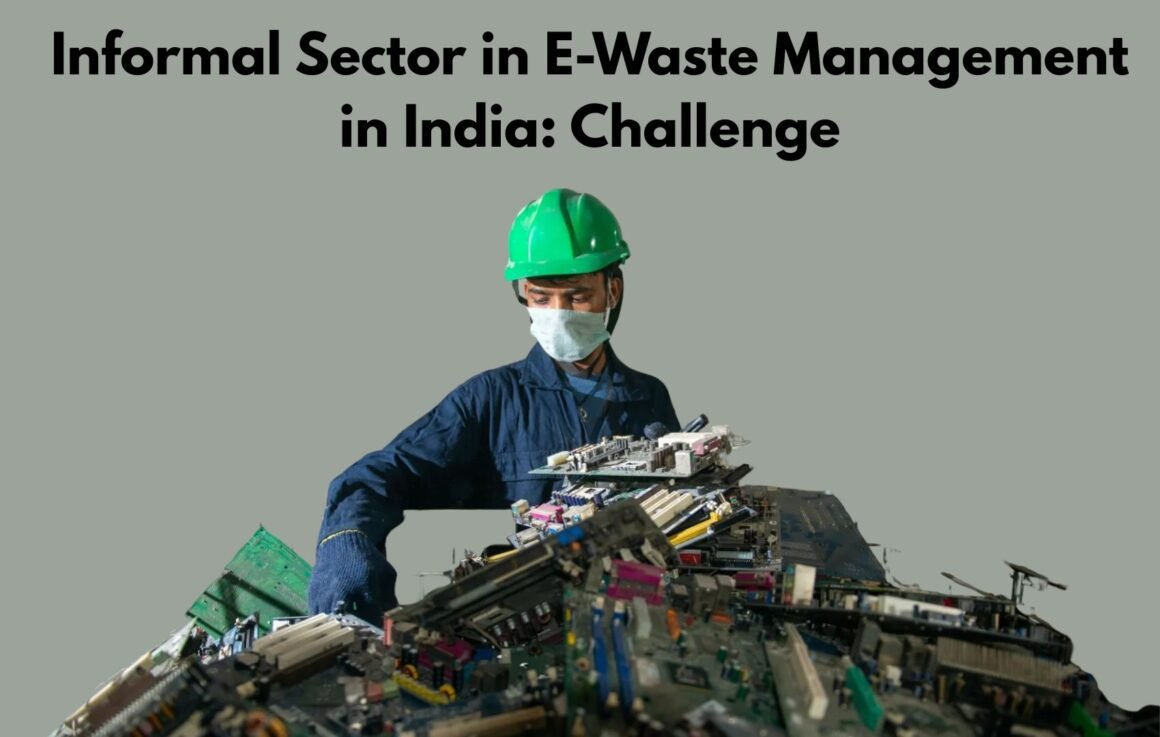Informal Sector in E-Waste Management in India: Challenge — where the unseen hands of India’s recyclers power a hidden economy, but at a heavy cost to health and the environment.”
The term Informal Sector in E-Waste Management in India: Challenge refers to the unorganised and unregulated network of individuals and small businesses involved in the collection, dismantling, refurbishing, and recycling of electronic waste. These are not officially registered or licensed entities, but rather grassroots operators, such as kabadiwalas, scrap traders, and small-scale recyclers, who handle e-waste using rudimentary techniques.

Although they play a crucial role in ensuring that discarded electronics are recovered and reused, their operations often lack environmental safeguards, proper technology, and worker protection. This makes the informal sector both indispensable and problematic — essential for waste collection yet responsible for severe pollution and health risks. The phrase “The Unseen Challenge” highlights how their contributions remain largely invisible in policy discussions and public awareness, even as they bear the brunt of hazardous recycling practices.
The global surge in electronic consumption has created a mounting e-waste crisis, with India ranking among the world’s top producers. While formal recycling systems are expanding, a large portion of the country’s e-waste continues to be managed by the informal sector — a complex network of kabadiwalas, scrap traders, dismantlers, and local recyclers. This unorganized yet indispensable ecosystem handles nearly 90% of India’s e-waste but operates outside any formal regulatory or safety framework.
The Backbone of India’s E-Waste Flow
In India, the informal sector plays a crucial role in collecting discarded electronics from households, businesses, and bulk consumers. These actors perform door-to-door collection and buy-back, ensuring that even small quantities of e-waste are recovered. Their efficiency and reach make them the most accessible and cost-effective collection system in the country. However, this strength also hides a major problem: unsafe recycling practices and lack of accountability.
The Dark Side of Informal Recycling
Most informal recyclers use crude and hazardous methods such as open burning of wires to extract copper, acid leaching to recover precious metals, and manual dismantling without protective equipment. These practices release toxic chemicals including lead, cadmium, mercury, and brominated flame retardants into the environment. The health impact on workers is devastating — respiratory disorders, neurological damage, kidney and liver failure, and even cancer are common among unprotected recyclers. Children and women, often part of these informal setups, face even higher risks due to direct exposure.
Informal Sector in E-Waste Management in India: Challenge – Environmental Fallout
Improper e-waste handling contaminates soil, water, and air. Open burning releases dioxins and furans, acid baths seep into groundwater, and heavy metals accumulate in food chains. In cities like Delhi, Moradabad, and Seelampur, pollution levels around informal e-waste hubs are alarmingly high. The absence of waste segregation and environmental safeguards amplifies the ecological cost of informal recycling.
Policy Gaps and Lost Opportunities
Despite the E-Waste (Management) Rules, 2022, which emphasise Extended Producer Responsibility (EPR) and formal recycling, the informal sector remains outside the purview of regulation. Because informal workers dominate collection and initial dismantling, formal recyclers face feedstock shortages. This leakage of material to unregulated handlers undermines the effectiveness of formal recycling channels and prevents the tracking of hazardous waste streams.
Informal Sector in E-Waste Management in India: Challenge -The Case for Integration, Not Elimination
Experts argue that dismantling the informal system isn’t feasible or desirable. Instead, India needs an inclusive model that integrates informal actors into the formal chain through training, licensing, financial incentives, and technology transfer. By equipping informal workers with protective gear, eco-friendly methods, and buy-back agreements with authorized recyclers, the government can create a hybrid ecosystem that is both efficient and sustainable.
Successful examples already exist. In Delhi and Pune, partnerships between recyclers and informal aggregators have shown how structured collaboration can improve safety standards and material recovery rates. With proper policy intervention, India can turn this vast informal network into an organized workforce contributing to the circular economy.
Informal Sector in E-Waste Management in India: Challenge
The Informal Sector in E-Waste Management in India: Challenge and an Opportunity. It sustains the waste flow, provides livelihoods, and fills critical gaps in collection, yet it endangers human health and the environment. Addressing this paradox requires collaboration, capacity building, and the design of inclusive policies. Recognising and integrating informal workers is the key to ensuring that India’s e-waste journey moves from chaos to circularity — transforming what is now an unseen challenge into a visible success story for sustainable development.
FOR MORE BLOGS – beyondthepunchlines.com

 Add to favorites
Add to favorites






